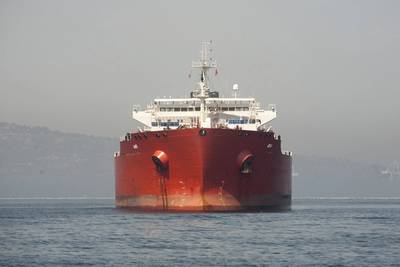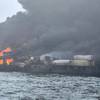U.S. Sanctions Bite; Traders Shun 300 Tankers
Nearly 300 oil tankers globally have been placed off limits as companies fear violating U.S. sanctions against Iran and Venezuela, driving freight rates to new highs, industry sources said.
The move has taken roughly 3% of the global oil tanker fleet out of the market, according to industry sources and data on Refinitiv Eikon, sending rates soaring to secure tankers to ship oil, particularly to Asia.
"Freight rates are going through the roof and people are getting very nervous with the cost of shipping," a crude oil trader in Asia said on Friday, declining to be identified as he was not authorised to talk to media.
Unipec, the trading arm of China's Sinopec, Swiss trader Trafigura AG, oil firm Equinor ASA , Exxon Mobil Corp are shunning 250 crude and oil products tankers which have carried Venezuelan oil in the past year.
Oil companies are also avoiding 43 oil tankers owned by COSCO Shipping Tanker (Dalian) after the United States last month imposed sanctions on two units of Chinese shipping giant COSCO for allegedly transporting Iranian crude.
COSCO Dalian also owns 3% of the global very large crude carrier (VLCC) fleet and the absence of its ships was a key driver for supertanker freight rates which hit new highs daily over the past two weeks, traders and shipbrokers said.
"This is now a handicapped set of vessels which are difficult to trade," Anoop Singh, regional head of tanker research at ship broker Braemar ACM, said, referring to the COSCO Dalian tankers.
Disruptions from the recent attacks on Saudi oil facilities and the ban on ships that called on Venezuelan ports in the past year have exacerbated tightness in the tanker market, he added. Braemar estimates another 23 VLCCs are also out of service to install emissions cleaning equipment to meet stricter global marine fuel rules from January 2020.
VLCC freight rates for key crude oil supply routes to Asia have surged since the U.S. ratcheted up sanctions in recent months.
The Singapore Petroleum Co, wholly owned by PetroChina, has provisionally chartered VLCC Houston to load crude in the Middle East for China in early November at 205 Worldscale points, in what could be the highest rate so far in the market, a trade source who tracks the market closely said on Friday.
The rate was at W67 prior to sanctions, according to a shipbroker. <DFRT-ME-CN>
VLCC rates for U.S. Gulf to Asia <TD-LPP-SIN>, the longest crude oil shipping route globally, hit a new high of $14 million this week, raising costs for oil buyers in Asia.
Reporting by Marianna Parraga














